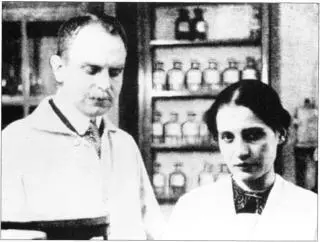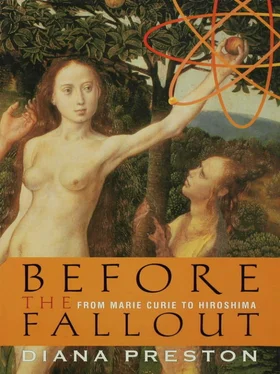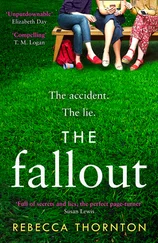By then Mileva had divorced him for adultery committed with his cousin, Elsa Einstein, whom he had subsequently married. Einstein was now so famous that a little girl wrote to him asking whether he really existed. However, his celebrity had made him the focus of a virulent attack from parts of the German media and academia angry that this much-lauded international figure was a Jew. They also resented his determined and outspoken pacifism during the war. Einstein received death threats and was warned that “it would be dangerous for him to appear anywhere in public in Germany.” He and Elsa departed on a trip to Japan and the Far East until the mood calmed.

Otto Hahn and Lise Meitner
Otto Hahn and Lise Meitner were working together at the prestigious Kaiser Wilhelm Institute for Chemistry in the Dahlem suburb of Berlin. The institute—sponsored jointly by government and industry and one of a network of such bodies set up in Germany across the scientific disciplines, including one for physics under Einstein’s directorship—had opened back in 1912 in a blaze of celebration led by the kaiser in white-plumed hat. That year Meitner had for the first time begun to receive a salary.
Like Rutherford, she and Hahn had continued their research sporadically, despite their war work. Meitner had volunteered as an x-ray nurse with the Austro-Hungarian army but had returned to the institute in 1916 to continue a task started two years earlier: the tracking down of a new element. She consulted Hahn, engaged in gas warfare research, by letter. He replied when he could and occasionally visited her in Berlin. The work was often overshadowed by wartime tragedies, such as the news that one of Max Planck’s two sons had been killed in France in 1916. However, in March 191 8 she and Hahn announced that they had found the new element—proactinium. Meitner had done most of the work, but the paper was in their joint names. Later that year she worked briefly with Einstein, and their admiration was mutual. Shortly afterward she was given the title of professor at the Kaiser Wilhelm Institute. It was some compensation for the difficult and uncertain times in which she was living. A brief visit to friends in Sweden provided an opportunity to eat foods that were just a memory in Germany: “eggs, butter, bacon, puddings, in short everything good.”
Germany’s defeat and the kaiser’s abdication in November 1918 had produced revolution, mutiny, street fighting, and strikes throughout the country. Discharged soldiers and sailors joined rival “red” and “white” militias supporting the socialist or conservative factions. Civil order disintegrated and living conditions deteriorated as workers quit their posts for the barricades. In Berlin Hahn was among those volunteering to keep the local power station going, raking the hot cinders to keep the coal burning well. The establishment of the Weimar Republic—named after its seat of government, Weimar, in eastern Germany—brought some stability, but life remained very tough. In 1922 terrifying inflation took hold, reducing the mark’s worth to almost nothing. The professors brought rucksacks and suitcases to collect salaries that were now paid daily in bundles of increasingly worthless paper. Hahn’s wife, Edith, whom he had married in 1913, met him every day to get his salary and then cycled frantically off to the grocer’s, hoping to be in time “to do her shopping at the previous day’s prices.”
In November 1923—the height of the economic mayhem—food riots broke out, and Adolf Hitler failed in his attempted putsch in Munich. Against this background, work was a welcome refuge for the scientists of Berlin. Hahn wrote that “while we were busy in the laboratory we simply forgot all our worries about food and food-coupons.” Paradoxically, despite the political and economic turmoil that launched them, they would remember the 1920s as a period of enthusiasm, openness, generosity, collaboration, and achievement in German science. They had stumbled on “the secrets of nature” and “whole new processes of thought, beyond all the previous notions in physics, would be needed to resolve the contradictions.”
The University of Gottingen, founded in 1737, played a leading role in reconciling these contradictions. Gottingen was an ancient city on the slopes of the Hain Mountain in lower Saxony, some sixty miles southeast of Hanover. Its professors, living in creeper-clad villas, seemed demigods. One of the most highly esteemed was the theoretical physicist Max Born, who had found solace from his war work with Einstein. Together they played violin sonatas and discussed relativity. Born had been attached to an army research unit whose task was “sound ranging”—calculating the position of enemy guns by measuring the arrival times of their reports at various listening posts. His experiences convinced him that “henceforth not heroism but technology would become decisive in war.”
The intellectual atmosphere in Gottingen was highly charged and at times surreal. Young scientists argued and debated in cafes, improvising mathematical formulae on tablecloths. Reputedly they roamed the streets at night, unable to sleep and impatient for the doors of their laboratories to open. In 1922 Gottingen hosted a Bohr Festival. Niels Bohr was by then a major international figure. He had persuaded the University of Copenhagen to open a theoretical physics institute and, reluctantly declining Rutherford’s invitation to come to England and “make physics boom,” had become its director. Later that year, he would be awarded the Nobel Prize for Physics for his quantized model of the atom. The chance to hear Bohr attracted a fit, blond, boyish twenty-year-old student, Werner Heisenberg, from Munich.
Heisenberg’s adolescence had been traumatic. As he later recalled, the war had burst open “the cocoon in which home and school protect the young in more peaceful periods.” In 1919 he had witnessed street fighting between the communists of the Munich Soviet Republic and government troops. With his family close to starvation, he had dodged through the lines to fetch bread, butter, and bacon. While serving in an anticommunist militia, he had seen a friend shoot himself in the stomach by accident and die in agony before his eyes. Disintegration, chaos, and civil war had awakened a desire to seek new certainties in a world untainted by politics—namely, the world of science. However, they had also left him with an enduring fear of communism and a patriotic recognition of the need for stronger government structures if Germany were to prosper once more.
While recovering from a serious illness, Heisenberg read about Einstein’s theories of relativity. The mathematical arguments and the abstract thoughts underlying them both excited and disturbed him. He enrolled at Munich University to study theoretical physics under Professor Arnold Sommerfeld, whose contributions in the fields of quantum theory and relativity and brilliance as a teacher were legendary. Another of Sommerfeld’s students was the sharply clever Wolfgang Pauli. Pauli and Heisenberg became close friends, though their habits were diametrically opposed. Heisenberg loved hiking and camping expeditions and became a leader in one of the many youth movements then springing up with the aim of renewing the spiritual and physical vigor of German youth. Pauli was a night owl, happiest in smoky cafes. He worked through the night and would not rise until noon. He teased the fresh-faced Heisenberg for being a “prophet of nature.” In 1920 Pauli would propose his famous “exclusion principle,” suggesting—on the basis of his experimental observations of how electrons behaved when subjected to magnetic fields—that no more than two electrons could inhabit the same orbit around a nucleus. This resolved a hitherto puzzling anomaly and earned him the nickname of the “Atomic Housing Officer.”
Читать дальше













